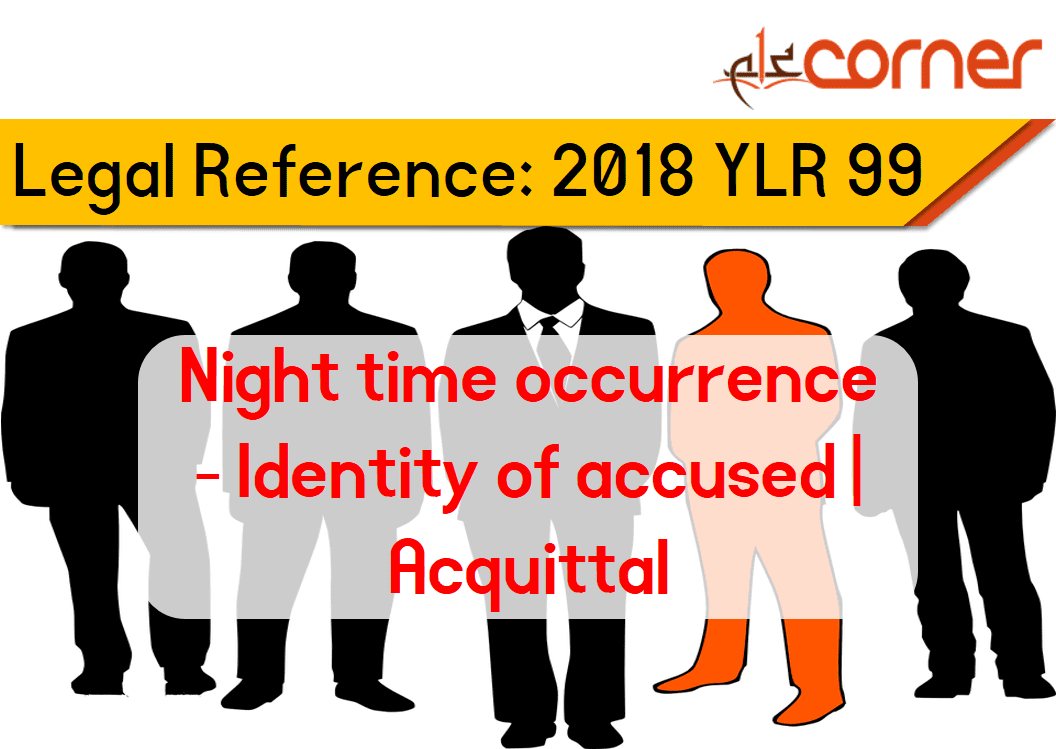(a) Criminal trial—
—-Sentence— Principle— Conviction involving ultimate penalty cannot be based upon a presumptive
or moral satisfaction in absence of positive proof.
(b) Penal Code (XLV of 1860)—
—-S.302(b)—Qatl-i-amd—Appreciation of evidence—Solitary witness, evidence of—Scope—Solitary
witness can sustain charge of capital sentence provided his testimony rings true and found synchronized
with in the ambit of probability.
(c) Penal Code (XLV of 1860)—
—-S. 302(b)—Qatl-i-Amd—Appreciation of evidence—Benefit of doubt—Night time occurrence—
Identity of accused—Medical and ocular account—Deceased person had married daughter of principal
accused without parental approval—First Information Report was registered against two persons after
one and half years—Trial Court convicted both the accused and sentenced principal accused to death
while co-accused was sentenced to imprisonment for life—Validity—Invitation by hostile in-laws for a
visit that too at an odd hour of night in the month of February sounded preposterous—Obliging
promptitude to accept such call without soliciting purpose thereof was no less mind boggling—Family
could have postponed the visit to a more convenient point of time under safer environment and with
appropriate precautions—Prosecution case from its inception was far from being confidence inspiring—
Occurrence was a night time affair in a chilled winter night, question of identity of assailants was
another dilemma confronting prosecution—Site plan showed that electric bulb was illuminated in
courtyard but none was taken into custody—Draftsman admitted that he himself did not see any bulb
and merely mentioned its presence in the site plan on the asking of complainant and prosecution
witnesses and except the bulb there was no other source of light—Mute presence of witnesses
throughout during the occurrence and alarm thereafter was inconceivable to say the least—Complaint
and inquest report were drafted at the spot and in column No. 24 of the inquest report dead body was
found lying with head and the same was not in consonance with the narrative furnished by investigating
officer, who claimed to have retrieved the head of the victim from a well near another village and
deputed a police constable to escort the dead body—As to how the investigating officer reached to the
well and who disclosed its location were the issues left to the imagination of court—Inquest report was
prepared much later than the time mentioned therein and there was possibility that complaint was
recorded subsequent to the point of time mentioned therein after consultation and deliberations—
Forensic Science Laboratory report was negative and prosecution case was tumbling on forensic side as
well—In a violent crisis situation with witnesses standing next to deceased, removal of head of deceased
by co-accused merely to be thrown in a deserted well was without any logical explanation and instead
spelled out some different scenario—Admission by Medical Officer in his cross-examination that he
conducted autopsy on dead body without head was a position diametrically inconsistent with the
statement of investigating officer as well as description given in inquest report—Statement of police
constable who escorted the dead body was also out of tune—Evidence presented by prosecution did not
fit within the ambit of probability—Occurrence probably did not take place in the manner as alleged in
the crime report—Conviction could not be maintained merely on the premise that accused harboured the
only possible motive against deceased, for it required evidentiary certainty to hold the charge, and it was
unsafe to maintain conviction—High Court extended benefit of doubt to accused persons, set aside
conviction and sentences awarded by Trial Court and acquitted them of the charge—Appeal was
allowed in circumstances.
